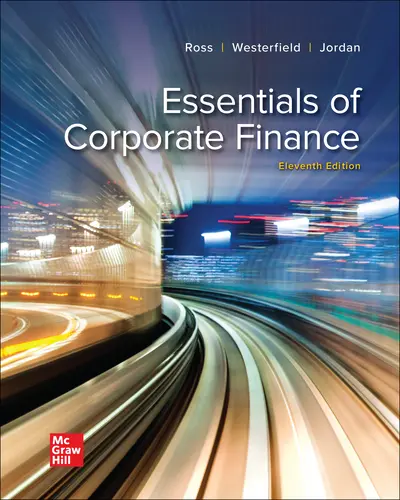
Orders within the United States are shipped via FedEx or UPS Ground. For shipments to locations outside of the U.S., only standard shipping is available. All shipping options assume the product is available and that processing an order takes 24 to 48 hours prior to shipping.
View PriceNote: Connect can only be used if assigned by your instructor.
Learn more about Connect >Orders within the United States are shipped via FedEx or UPS Ground. For shipments to locations outside of the U.S., only standard shipping is available. All shipping options assume the product is available and that processing an order takes 24 to 48 hours prior to shipping.
View Price* The estimated amount of time this product will be on the market is based on a number of factors, including faculty input to instructional design and the prior revision cycle and updates to academic research-which typically results in a revision cycle ranging from every two to four years for this product. Pricing subject to change at any time.
Quick Actions (Only for Validated Instructor Accounts):
Request an Ebook Sample Request a Print Sample Contact a RepEssentials of Corporate Finance focuses on what undergraduate students with widely varying backgrounds need to carry away from a core course in business or corporate finance. The goal is to convey the most important concepts at a level that is approachable for the widest possible audience. Essentials is written in a relaxed, conversational style that invites the students to join in the learning process rather than being a passive information absorber.
Essentials has three basic themes as a central focus: An Emphasis on Intuition: We always try to separate and explain the principles at work on a commonsense, intuitive level before launching into any specifics. A Unified Valuation Approach: We treat net present value (NPV) as the basic concept underlying corporate finance. A Managerial Focus: Students shouldn’t lose sight of the fact that financial management concerns management. We emphasize the role of the financial manager as decision-maker, and we stress the need for managerial input and judgment.
Part One: Overview of Financial Management
Chapter 1: Introduction to Financial Management
Part Two: Understanding Financial Statements and Cash Flow
Chapter 2: Financial Statements, Taxes, and Cash Flow
Chapter 3: Working with Financial Statements
Part Three: Valuation of Future Cash Flows
Chapter 4: Introduction to Valuation: The Time Value of Money
Chapter 5: Discounted Cash Flow Valuation
Part Four: Valuing Stocks and Bonds
Chapter 6: Interest Rates and Bond Valuation
Chapter 7: Equity Markets and Stock Valuation
Part Five: Capital Budgeting
Chapter 8: Net Present Value and Other Investment Criteria
Chapter 9: Making Capital Investment Decisions
Part Six: Risk and Return
Chapter 10: Some Lessons from Capital Market History
Chapter 11: Risk and Return
Part Seven: Long-Term Financing
Chapter 12: Cost of Capital
Chapter 13: Leverage and Capital Structure
Chapter 14: Dividends and Dividend Policy
Chapter 15: Raising Capital
Part Eight: Short-Term Financial Management
Chapter 16: Short-Term Financial Planning
Chapter 17: Working Capital Management
Part Nine: Topics in Business Finance
Chapter 18: International Aspects of Financial Management
Appendices
Appendix A: Mathematical Tables
Appendix B: Key Equations
Appendix C: Answers to Selected End-of-Chapter Problems
Appendix D: Using the HP-10B and TI BA II Plus Financial Calculators
Stephen Ross
Stephen A. Ross was the Franco Modigliani Professor of Financial Economics at the Sloan School of Management, Massachusetts Institute of Technology. One of the most widely published authors in finance and economics. Professor Ross is recognized for his work in developing the arbitrage pricing theory, along with his substantial contributions to the discipline through his research in signaling, agency theory, option pricing, and the theory of the term structure of interest rates, among other topics. A past president of the American Finance Association, he also served as an associate editor of several academic and practitioner journals, and was a trustee of CalTech.
Randolph Westerfield
Randolph W. Westerfield is Dean Emeritus of the University of Southern California’s Marshall School of Business and is the Charles B. Thornton Professor of Finance Emeritus. Professor Westerfield came to USC from the Wharton School, University of Pennsylvania, where he was the chairman of the finance department and member of the finance faculty for 20 years. He is a member of the Board of Trustees of Oaktree Capital Mutual Funds. His areas of expertise include corporate financial policy, investment management, and stock market price behavior.
Bradford Jordan
Bradford D. Jordan is Visiting Scholar at the University of Florida. He previously held the duPont Endowed Chair in Banking and Financial Services at the University of Kentucky, where he was department chair for many years. He specializes in corporate finance and securities valuation. He has published numerous articles in leading finance journals, and he has received a variety of research awards, including the Fama/DFA Award in 2010.
Dr. Jordan is coauthor of Corporate Finance 13e, Corporate Finance: Core Principles and Applications 7e, Fundamentals of Corporate Finance 13e, and Essentials of Corporate Finance 1le, which collectively are the most widely used business finance textbooks in the world, along with Fundamentals of Investments: Valuation and Management 10e, a popular investments text.